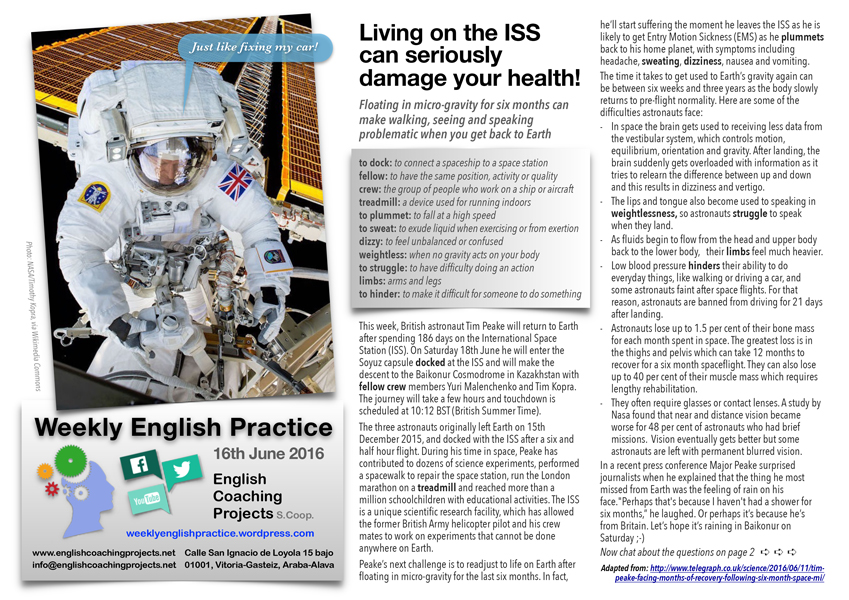Click on the image to download the pdf
Floating in micro-gravity for six months can make walking, seeing and speaking problematic when you get back to Earth
Vocabulary. Read and check you understand this before you read and listen to the article:
to dock: to connect a spaceship to a space station
fellow: to have the same position, activity or quality
crew: the group of people who work on a ship or aircraft
treadmill: a device used for running indoors
to plummet: to fall at a high speed
to sweat: to exude liquid when exercising or from exertion
dizzy: to feel unbalanced or confused
weightless: when no gravity acts on your body
to struggle: to have difficulty doing an action
limbs: arms and legs
to hinder: to make it difficult for someone to do something
This week, British astronaut Tim Peake will return to Earth after spending 186 days on the International Space Station (ISS). On Saturday 18th June he will enter the Soyuz capsule docked at the ISS and will make the descent to the Baikonur Cosmodrome in Kazakhstan with fellow crew members Yuri Malenchenko and Tim Kopra. The journey will take a few hours and touchdown is scheduled at 10:12 BST (British Summer Time).
The three astronauts originally left Earth on 15th December 2015, and docked with the ISS after a six and half hour flight. During his time in space, Peake has contributed to dozens of science experiments, performed a spacewalk to repair the space station, run the London marathon on a treadmill and reached more than a million schoolchildren with educational activities. The ISS is a unique scientific research facility, which has allowed the former British Army helicopter pilot and his crew mates to work on experiments that cannot be done anywhere on Earth.
Peake’s next challenge is to readjust to life on Earth after floating in micro-gravity for the last six months. In fact, he’ll start suffering the moment he leaves the ISS as he is likely to get Entry Motion Sickness (EMS) as he plummets back to his home planet, with symptoms including headache, sweating, dizziness, nausea and vomiting.
The time it takes to get used to Earth’s gravity again can be between six weeks and three years as the body slowly returns to pre-flight normality. Here are some of the difficulties astronauts face:
- In space the brain gets used to receiving less data from the vestibular system, which controls motion, equilibrium, orientation and gravity. After landing, the brain suddenly gets overloaded with information as it tries to relearn the difference between up and down and this results in dizziness and vertigo.
- The lips and tongue also become used to speaking in weightlessness, so astronauts struggle to speak when they land.
- As fluids begin to flow from the head and upper body back to the lower body, their limbs feel much heavier.
- Low blood pressure hinders their ability to do everyday things, like walking or driving a car, and some astronauts faint after space flights. For that reason, astronauts are banned from driving for 21 days after landing.
- Astronauts lose up to 1.5 per cent of their bone mass for each month spent in space. The greatest loss is in the thighs and pelvis which can take 12 months to recover for a six month spaceflight. They can also lose up to 40 per cent of their muscle mass which requires lengthy rehabilitation.
- They often require glasses or contact lenses. A study by Nasa found that near and distance vision became worse for 48 per cent of astronauts who had brief missions. Vision eventually gets better but some astronauts are left with permanent blurred vision.
In a recent press conference Major Peake surprised journalists when he explained that the thing he most missed from Earth was the feeling of rain on his face.”Perhaps that’s because I haven’t had a shower for six months,” he laughed. Or perhaps it’s because he’s from Britain. Let’s hope it’s raining in Baikonur on Saturday 😉
“Let’s chat about that!”
- Do you agree with spending public money on missions in space? Why/why not?
- Would you like to travel into orbit? Or to the moon or another planet?
- Do you think humans will ever live in colonies in space/on the moon/another planet?
- Have you ever had any of the symptoms described in the article?
- If you had to spend a long period of time in space what would you miss?
- Who would you like to send on a one-way mission into space? ????
- Look at the quotes below and chat about them with your colleagues and coach
Adapted from: http://www.telegraph.co.uk/science/2016/06/11/tim-peake-facing-months-of-recovery-following-six-month-space-mi/


